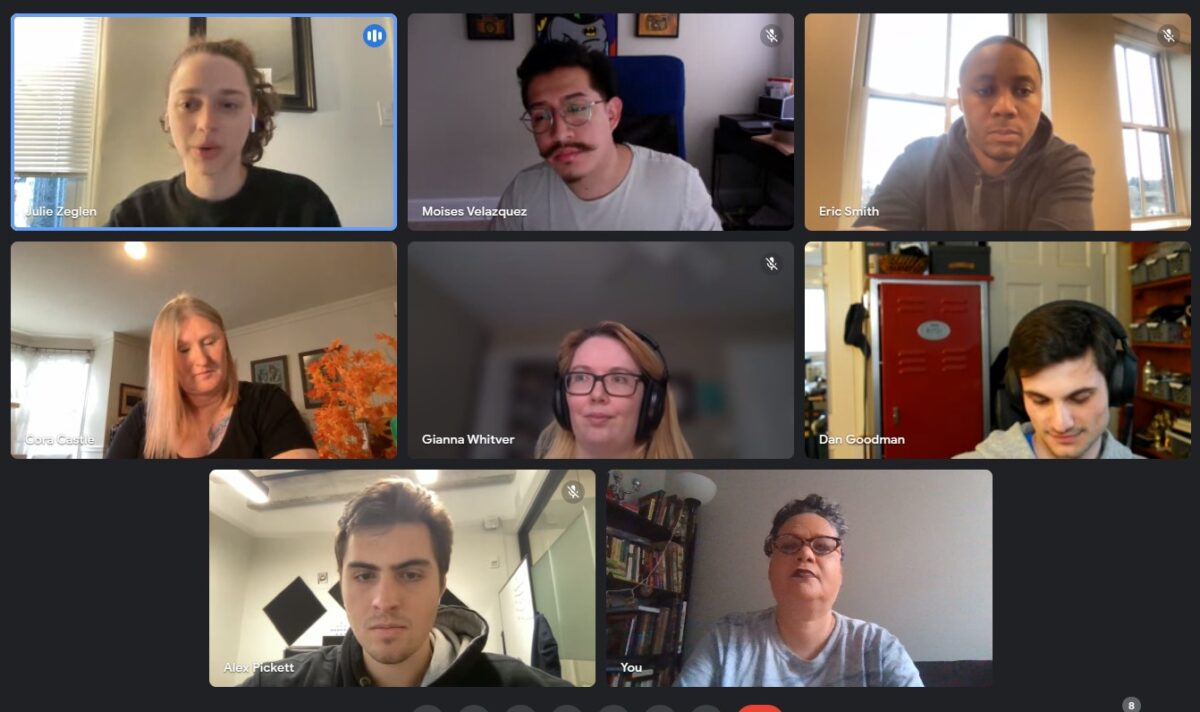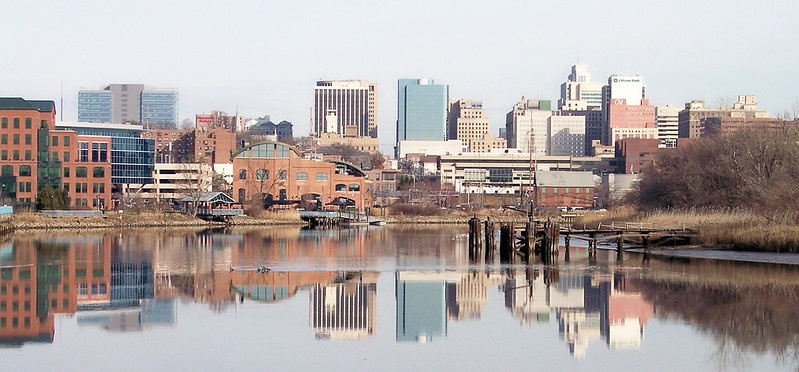Technical.ly gathered a handful of Delaware founders whose companies made the 2023 RealLIST Startups for a stakeholder meeting last week to discuss the state of local entrepreneurship. The startups on this list represent a range of different industries, including green tech, cybersecurity and hard tech, with founders ranging from lifelong Delawareans to recent transplants.
Attending the meeting were Dan Goodman and Alex Pickett, founders of Tangia; Cora Castle, cofounder of OmniPotential Energy Partners; Gianna Whitver, cofounder of the Cybersecurity Marketing Society; Moisés Velázquez, cofounder of Better Puzzles; and Eric Smith, cofounder of Launch Point Labs.
Here’s what they said:
Networking is a challenge
Whitver moved to Newark in 2022 from the Tampa Bay region, which is considered an emerging startup center. Her work as a cofounder of the Cybersecurity Marketing Society is 100% remote, which makes it even more difficult to connect with other founders and cybersecurity professionals.
“I was [in Tampa] during its progression from kind of a nowhere place to being a really hot startup hub,” she said. “The main difference I saw was a lot of community, an ecosystem that was proactively built into the area. You knew where to go if you were a founder to meet other founders. And here, I think it’s been harder to connect with folks.”
This pain point was elevated by the COVID-19 pandemic, but it’s also a long-held challenge in most of the state. Even in Wilmington, where most of the coworking spaces, incubators and accelerators live, it’s known to be a challenge for “outsiders.”
There is a serious lack of investors
As one response to Delaware’s dearth of local VC investors, young companies have turned to equity crowdfunding following the passage of expanded SEC crowdfunding rules in 2020.
This dearth is a problem for businesses of all sizes, but it’s essentially untenable for Silicon Valley-style tech startups like Tangia, which makes a platform to help streamers increase engagement.
“All of the investors that we ended up working with were either out of the Bay Area, Boston [or] New York City,” Goodman said. “Which makes it really hard, because not only do we have to fly out there, but it means that all the people that we share the same business experiences with are not around us as well. It makes it hard as someone with our company profile, where we have slightly different challenges than someone who’s doing a bootstrapped tech startup, and sharing those challenges would be extremely hard if we weren’t part of the Y Combinator network, which thankfully has made it infinitely easier for us.”
This environment, combined with the challenges of competing with banks for top talent, leads to entrepreneurial flight from Delaware. For every community-focused business and lab startup that stays, an untold number of potential tech startup founders leave.
That will soon include Tangia — the startup that was founded during Goodman and Pickett’s time at University of Delaware will relocate in 2023.
Small size can be an advantage
One area that is regularly cited as a perk of stating a business in Delaware is its size and the accessibility of leaders and lawmakers. That kind of accessibility is essential for OmniPotential Energy’s Castle: The startup can’t install residential electric vehicle charging stations without new legislation allowing permits for them.
“I believe that in Delaware, at least in my experience, access is easy, but access to capital is hard. There has yet to be somebody in the state of Delaware that I have wanted to meet with and I have been unable to arrange a meeting,” Castle said.
Still, “funding is so hard,” she said.” There are just so few opportunities. For my company, we really needed policy change, so I think the smallness of the state works in our favor, because we can have sort of that ‘Delaware effect.’ I can get in and meet with legislators and talk to them about legislation and pass a bill that requires a supermajority, but I basically had to keep my company alive for three years since the beginning of COVID out of my own pocket.”
Certain lab industries like pharmaceuticals and STEM-based technology — especially those that can get federal grants to do their work — tend to have an easier time in Delaware, with its DuPont history. But funding remains a huge pain point.

Technical.ly chats with Delaware startup founders. (Screenshot)
Talent can be hard to come by
Velázquez cofounded Better Puzzles as a pandemic project on the side of his career as a Mid-Atlantic Emmy-winning filmmaker. One of the core concepts of the puzzles was to create income streams for local visual artists. Ultimately, they used artists from around the region because of difficulty connecting with Delaware artists.
“Initially, our experience with the Delaware space was pretty good because of prices, connections and everything,” he said. “We were in the Pete du Pont Freedom Foundation [via the E3 program], and we got access to a lot of help in that sense. But when it really came time to think bigger and go bigger, that’s really where we hit some bumps in the road.”
Still, as a filmmaker, Velázquez likes working in Delaware and adding to the state’s creative environment. Among his local projects is a music video for Warner Brothers partly filmed at McKean High School.
The ecosystem is still developing
The ecosystem is personal — well, technically, it’s business — for Smith, cofounder of the startup studio Launch Point Labs. He’s doing his part to bring funding opportunities to local entrepreneurs by building a $5 million investment fund for startups, in addition to a pool of contractors to help startups fill talent gaps. The company is doing well, but it’s not getting a lot of Delaware startups joining the studio despite being here, he said.
“When we look for new people to join up on our team, a lot of times we are looking outside of the state. Not that we’re ignoring the students that are here or ignoring the people that are here — it just seems that more people from outside of the state have more of that startup experience,” Smith said. “We ran the internship program and 100% of them were from out of state.”
Which, to bring things full circle, could change with the kind of more robust startup ecosystem network Whitver talked about.
“I think that as the state continues to improve, and hopefully this idea of entrepreneurship continues to take foothold in Delaware, there will be a larger selection of people to be able to choose from and collaborate with,” Smith said.
All things we’re keeping in mind for ’23.
Join our growing Slack community
Join 5,000 tech professionals and entrepreneurs in our community Slack today!
Donate to the Journalism Fund
Your support powers our independent journalism. Unlike most business-media outlets, we don’t have a paywall. Instead, we count on your personal and organizational contributions.





